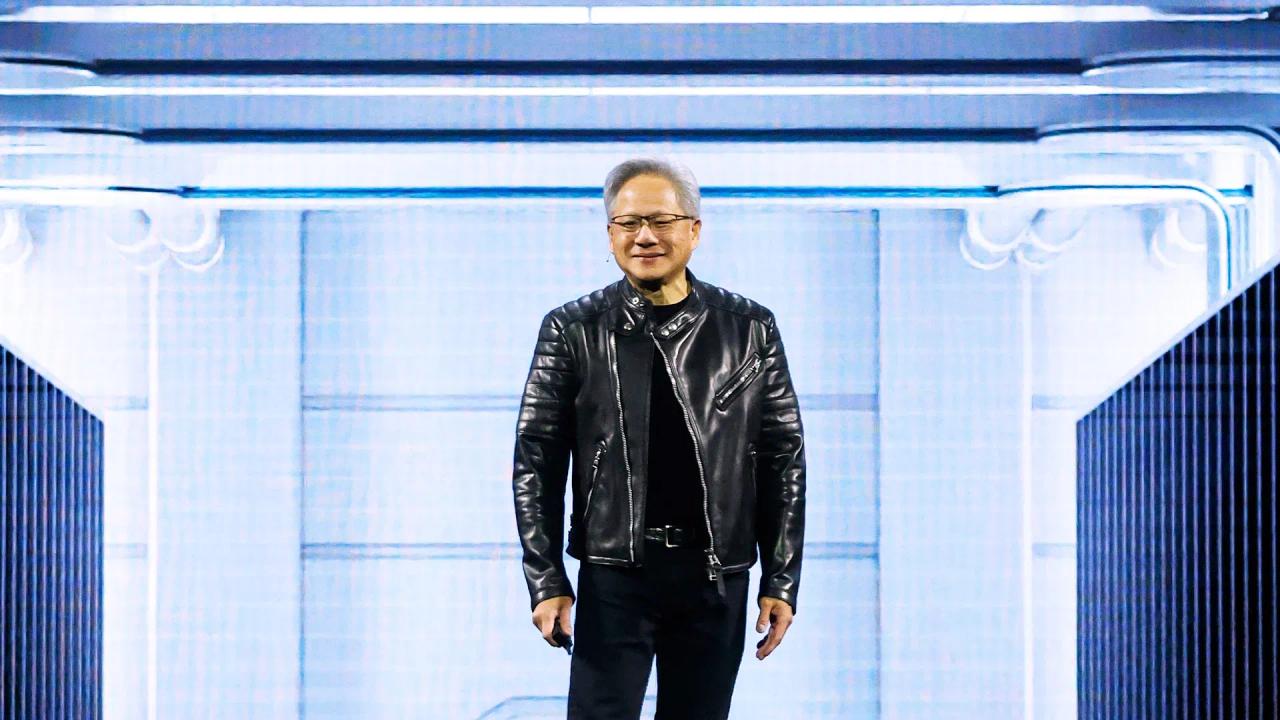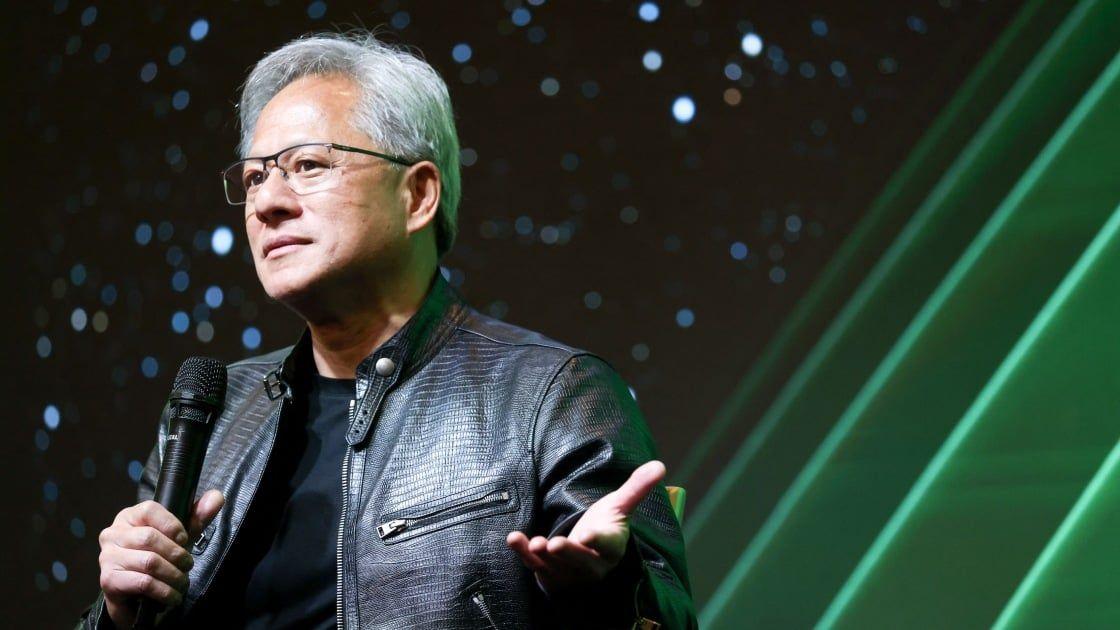Nvidia CEO Urges Japan to Boost Power Generation for AI Development
3 Sources
3 Sources
[1]
Nvidia CEO lobbies Japan to generate more power to fuel AI
Nvidia CEO Jensen Huang met with Prime Minister Shigeru Ishiba on Monday to push for more electricity generation to meet artificial intelligence's needs. The two discussed how Japan is particularly well-positioned to develop AI, given its leadership in robotics and industrial manufacturing, Huang told reporters after the meeting. But he also said that generating and creating intelligence will require energy. "The country needs to build new infrastructure," Huang said, eschewing his usual black leather jacket for a blue suit and tie. "Energy is essential for all industrial growth."
[2]
Nvidia's Jensen Huang Meets Japanese PM To Discuss AI's Growing Energy Needs - NVIDIA (NASDAQ:NVDA)
On Monday, Nvidia Corp NVDA chief Jensen Huang met with Japanese Prime Minister Shigeru Ishiba to canvass more electricity to power artificial intelligence's needs. Huang and Ishiba discussed how Japan is particularly positioned well to develop AI, given its leadership in robotics and industrial manufacturing. They acknowledged the importance of electric energy generation and new infrastructure to power their AI ambitions, Bloomberg reported, citing Huang. Also Read: Foxconn Eyes Nissan, Mitsubishi In Japan EV Push To Counter China's Growing Auto Threat However, Huang also said that generating and creating intelligence will need energy. Huang visited Beijing last week. Meanwhile, U.S. President Donald Trump shared plans to prohibit Nvidia from selling H20 AI chip to China amid intensifying geopolitical tensions spurred by U.S. blacklisting of Chinese companies like Huawei Technologies, semiconductor sanctions restricting China's access to advanced semiconductor technologies, and a tariff war between the countries. Last week, Nvidia warned of a $5.5 billion writedown from the newest U.S. chip embargo. Redburn Atlantic analyst Timm Schulze-Melander named Nvidia a 'top pick,' citing investments in leading-edge AI and chipmaking. Recent reports indicated Dutch advanced chipmaking equipment supplier ASML Holdings ASML plans to quintuple its Japan-based maintenance staff for the machines. Japan continues bolstering its advanced semiconductor technology position, as in the U.S., Europe, and China. Japanese multinational investment holding company Softbank Group Corp SFTBF SFTBY is also weighing a loan of up to $16.5 billion to finance its U.S. AI ambitions. Price Action: NVDA stock is down 3.32% at $98.12 at the last check on Monday. Read Next: Amkor Stock Under Pressure: Analyst Cuts Rating Due To Trade Policy Concerns, Slowing End Market Growth Photo by glen photo via Shutterstock NVDANVIDIA Corp$99.21-2.24%Stock Score Locked: Want to See it? Benzinga Rankings give you vital metrics on any stock - anytime. Reveal Full ScoreEdge RankingsMomentum55.88Growth94.78Quality97.24Value7.69Price TrendShortMediumLongOverviewASMLASML Holding NV$627.35-2.00%SFTBFSoftBank Group Corp$47.44-%SFTBYSoftBank Group Corp$23.50-1.05%TSMTaiwan Semiconductor Manufacturing Co Ltd$149.97-1.17%Got Questions? AskWhich energy companies could benefit from AI growth?How will Japan's semiconductor industry adapt to energy needs?Who stands to gain from Nvidia's AI infrastructure push?What impact will geopolitical tensions have on chipmakers?Could Softbank lead investments in U.S. AI?Which companies might suffer from the U.S. chip embargo?How will ASML benefit from Japan's tech investments?Are there investment opportunities in Japan's robotics sector?What role will renewable energy play in powering AI?How might Foxconn influence Japan's EV market?Powered ByMarket News and Data brought to you by Benzinga APIs
[3]
Nvidia CEO urges LDP to build up Japan's AI infrastructure
Nvidia CEO Jensen Huang urged the ruling Liberal Democratic Party on Tuesday to build out domestic artificial intelligence infrastructure that could fuel a robotics revolution, aligning with the government's goal to boost public- and private-sector funding in AI and semiconductors. Huang's exchange with the LDP's digital committee came a day after he met with Prime Minister Shigeru Ishiba and lobbied him to generate more power to fuel AI. "You must build it yourself because it's your intelligence," said Huang, who has run the U.S. semiconductor giant since 1993 and delivered the world's first DGX-1 server to OpenAI in 2016.
Share
Share
Copy Link
Nvidia CEO Jensen Huang meets with Japanese officials to discuss the country's potential in AI development and the need for increased energy infrastructure to support it.

Nvidia CEO Advocates for AI Infrastructure in Japan
Jensen Huang, CEO of Nvidia, has embarked on a diplomatic mission to Japan, urging the country to bolster its energy infrastructure to support the growing demands of artificial intelligence (AI) development. In a series of high-profile meetings with Japanese officials, Huang emphasized the critical role of power generation in fueling AI advancements and positioned Japan as a potential leader in the field.
Meeting with Prime Minister Shigeru Ishiba
On Monday, Huang met with Japanese Prime Minister Shigeru Ishiba to discuss Japan's potential in AI development
1
. The Nvidia CEO highlighted Japan's existing strengths in robotics and industrial manufacturing as key advantages for AI innovation. However, Huang stressed that realizing this potential would require significant investments in energy infrastructure."The country needs to build new infrastructure," Huang stated, emphasizing that "Energy is essential for all industrial growth"
1
. This meeting set the tone for Huang's broader message to Japanese leadership about the importance of power generation in supporting AI ambitions.Engagement with the Liberal Democratic Party
Following his meeting with the Prime Minister, Huang addressed the ruling Liberal Democratic Party's (LDP) digital committee on Tuesday
3
. He urged the LDP to prioritize the development of domestic AI infrastructure, aligning with the government's goals to increase both public and private sector funding in AI and semiconductors.Huang's message to the LDP was clear and direct: "You must build it yourself because it's your intelligence"
3
. This statement underscores the strategic importance of homegrown AI capabilities for national competitiveness and technological sovereignty.Japan's Position in the Global AI Landscape
Huang's visit to Japan comes at a critical time in the global AI race. With geopolitical tensions rising, particularly between the United States and China, Japan's role in the semiconductor and AI industries is becoming increasingly significant
2
. The country is seen as a potential counterbalance to China's growing influence in the tech sector.Recent reports indicate that Dutch chipmaking equipment supplier ASML Holdings plans to significantly expand its Japan-based maintenance staff, further solidifying Japan's position in advanced semiconductor technology
2
. This move aligns with similar efforts in the U.S. and Europe to strengthen domestic chip production capabilities.Related Stories
Energy Demands and Economic Implications
The push for increased energy generation to support AI development has broad economic implications. As AI technologies become more sophisticated and widespread, their energy consumption is expected to grow exponentially. This presents both challenges and opportunities for Japan's energy sector and could potentially drive investments in renewable energy sources.
Huang's advocacy for enhanced power infrastructure also highlights the intricate relationship between technological advancement and energy policy. As countries compete to lead in AI development, energy capacity and efficiency may become key differentiators in their ability to support cutting-edge research and applications.
Conclusion
Jensen Huang's diplomatic efforts in Japan underscore the critical intersection of AI development, energy infrastructure, and national competitiveness. As Japan considers its path forward in the global AI race, the country's ability to meet the growing energy demands of AI technologies may prove to be a decisive factor in its success. The outcomes of these high-level discussions could shape Japan's technological and energy policies for years to come, with potential ripple effects across the global AI and semiconductor industries.
References
Summarized by
Navi
[1]
[2]
[3]
Related Stories
NVIDIA Spearheads AI Revolution in Japan: Partnerships, Infrastructure, and Innovation
13 Nov 2024•Technology

Nvidia CEO Jensen Huang Envisions AI-Driven Future, Emphasizes US Manufacturing and Skilled Trades
01 May 2025•Technology

Nvidia CEO Jensen Huang Emphasizes Global Cooperation in AI Amid Potential Trump Administration Restrictions
23 Nov 2024•Technology

Recent Highlights
1
Pentagon threatens to cut Anthropic's $200M contract over AI safety restrictions in military ops
Policy and Regulation

2
ByteDance's Seedance 2.0 AI video generator triggers copyright infringement battle with Hollywood
Policy and Regulation

3
OpenAI closes in on $100 billion funding round with $850 billion valuation as spending plans shift
Business and Economy





